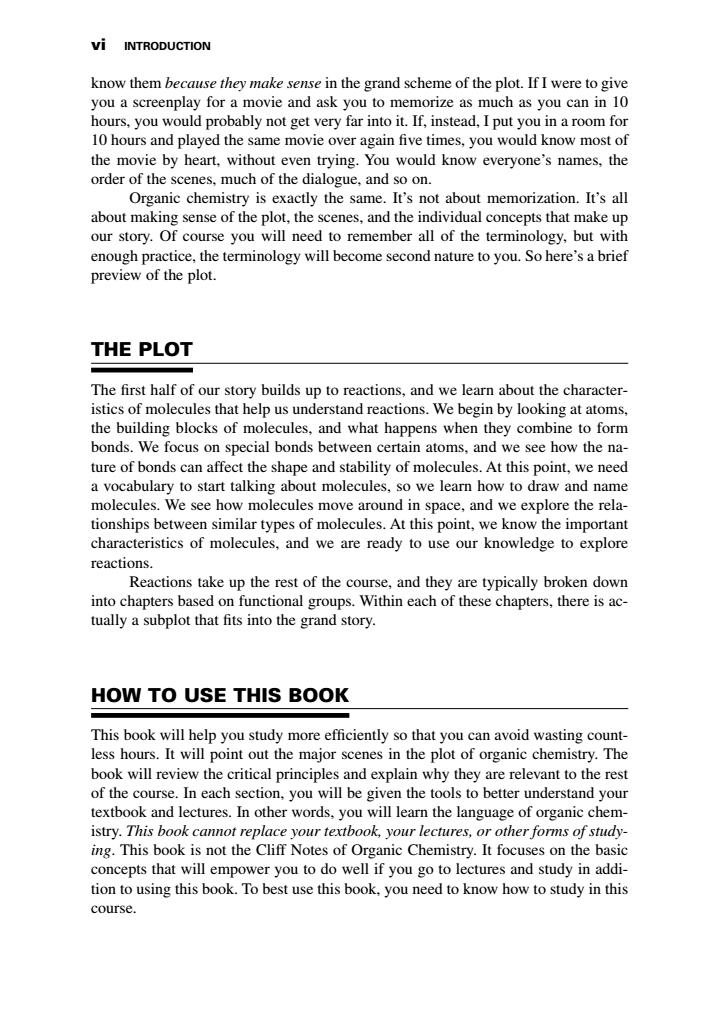正在加载图片...

vi INTRODUCTION know them because they make sense in the grand scheme of the plot.If I were to give you a screenplay for a movie and ask you to memorize as much as you can in 10 10hours and played the same movie overaain five times.you would knowmost of the movie by heart.without even trying.You would know everyone's names,the order of the scenes,much of the dialogue,and so on. Organic chemistry is exactly the same.It's not about memorization.It's all about making sense of the plot,the scenes,and the individual concepts that make up our story.Of course you will need to remember all of the terminology.but with enough practice,the terminology will become second nature to you.So here's a brief preview of the plot. THE PLOT The first half of our story builds up to reactions,and we learn about the character- istics of molecules that help us understand reactions.We begin by looking at atoms. the building blocks of molecules,and what happens when they combine to form bonds.We focus on special bonds between certain atoms.and we see how the na- ture of bonds can affect the shape and stability of molecules.At this point.we nee a vocabulary to start talking about molecules,so we learn how to draw and name molecules.We see how molecules move around in space,and we explore the rela- tionships between similar types of molecules.At this point,we know the important characteristics of molecules,and we are ready to use our knowledge to explore reactions Reactions take up the rest of the course,and they are typically broken dowr into chapters based on functional groups.Within each of these chapters.there is ac- tually a subplot that fits into the grand story. HOW TO USE THIS BOOK This book will help you study more efficiently so that you can avoid wasting count- less hours.It will point out the major scenes in the plot of organic chemistry.The book will review the critical principles and explain why they are relevant to the rest of the course. In each section .you will he gi iven the tools to better unde tand y textbook a 】1 ectures.In other words,you ill learn the language of organi istry.This book cannot replace your textbook,your lectures,or other forms of study ing.This book is not the Cliff Notes of Organic Chemistry.It focuses on the basic concepts that will empower you to do well if you go to lectures and study in addi- tion to using this book.To best use this book,you need to know how to study in this courseknow them because they make sense in the grand scheme of the plot. If I were to give you a screenplay for a movie and ask you to memorize as much as you can in 10 hours, you would probably not get very far into it. If, instead, I put you in a room for 10 hours and played the same movie over again five times, you would know most of the movie by heart, without even trying. You would know everyone’s names, the order of the scenes, much of the dialogue, and so on. Organic chemistry is exactly the same. It’s not about memorization. It’s all about making sense of the plot, the scenes, and the individual concepts that make up our story. Of course you will need to remember all of the terminology, but with enough practice, the terminology will become second nature to you. So here’s a brief preview of the plot. THE PLOT The first half of our story builds up to reactions, and we learn about the characteristics of molecules that help us understand reactions. We begin by looking at atoms, the building blocks of molecules, and what happens when they combine to form bonds. We focus on special bonds between certain atoms, and we see how the nature of bonds can affect the shape and stability of molecules. At this point, we need a vocabulary to start talking about molecules, so we learn how to draw and name molecules. We see how molecules move around in space, and we explore the relationships between similar types of molecules. At this point, we know the important characteristics of molecules, and we are ready to use our knowledge to explore reactions. Reactions take up the rest of the course, and they are typically broken down into chapters based on functional groups. Within each of these chapters, there is actually a subplot that fits into the grand story. HOW TO USE THIS BOOK This book will help you study more efficiently so that you can avoid wasting countless hours. It will point out the major scenes in the plot of organic chemistry. The book will review the critical principles and explain why they are relevant to the rest of the course. In each section, you will be given the tools to better understand your textbook and lectures. In other words, you will learn the language of organic chemistry. This book cannot replace your textbook, your lectures, or other forms of studying. This book is not the Cliff Notes of Organic Chemistry. It focuses on the basic concepts that will empower you to do well if you go to lectures and study in addition to using this book. To best use this book, you need to know how to study in this course. vi INTRODUCTION 6753_Klein_00.qxd 5/1/07 5:02 PM Page vi